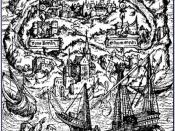Fantasy is important for the writers of utopias because the vision of reality is almost necessarily idealized or demonic. To put across the intensity and significance of either, the author departs from the dullness of everyday, and that can be done with fantasy. Since the creation of Earth, manhood searched the earth for the reasons of life and the pursuit of tranquality roaming the planet looking for personal answers to the questions that have plagued man forever. Some found them in religion; others may find them in such simple things as simple day to day activities. Some people have found the answers to some of the very questions of life by forming a society, which is the utopia. Utopia is a state of mind, a higher level of being, in which man finds what he is looking for. This thing that he finds must be mental to nature. Utopia differs for each individual.
In order for it to be possible for a utopia to exist it must fulfil the mental needs of all his inhabitants. If it fails to do so then it is a dystopia, an illusion that, while it lends itself to a vision of reality, truly does not exist. Orwell's 1984, Huxley's Brave New World, Vonnegut's Player Piano are all dystopias, all seek solutions to the problems of teaching us something positive through a negative example.
The senses are illusory. Descartes could prove that the mind existed, but he could not prove that the body existed. The same is true with utopias. Fantasy embraces utopias, which have allegories. Utopias seem included by Jackson's definition of fantasy as "literature of desire, which seeks that which is experienced as absence and loss". The perfection of utopias may not be possible in our world but desirable.
Thomas More's Utopia (1516)...


